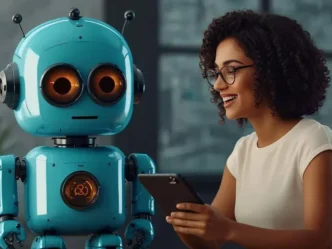Is the exploitation of artificial intelligence a global trait or does it vary by culture? A new study suggests the answer depends heavily on where you live. According to research from LMU Munich and Waseda University Tokyo, people in Japan show as much respect for AI systems as they do for humans. In contrast, Americans tend to treat artificial agents more like tools—ones that can be used to their own advantage without much ethical concern.
As self-driving cars, delivery drones, and other AI-driven robots become a part of daily life, this cultural divide could have real consequences for how societies adopt and interact with emerging technologies. The way people treat AI may influence everything from road safety to how quickly these systems are accepted.
How People from Different Cultures Cooperate with AI
In one of the most extensive cross-cultural studies of its kind, researchers used classic game theory models—the Trust Game and the Prisoner’s Dilemma—to explore whether people from different cultures behave differently when interacting with humans versus artificial agents. Participants made real-money decisions, choosing between cooperation and self-interest, sometimes facing off with another human and sometimes with an AI system.
The results were striking. American participants were far more likely to exploit AI than they were to take advantage of a human partner. Japanese participants, however, showed no such distinction. They cooperated with AI just as often as they did with people. According to lead researcher Dr. Jurgis Karpus, these subtle yet powerful behavioral differences could shape the path of AI adoption globally.
Guilt May Be the Emotional Driver Behind Human-AI Interaction
So what’s driving the divide? The study points to guilt as a central factor. Americans, it turns out, feel less guilt when exploiting an AI system compared to mistreating a fellow human. But Japanese participants reported similar emotional reactions—guilt, disappointment, even anger—whether they exploited a machine or a person.
This emotional parity suggests that people in Japan may see artificial agents as more than just soulless tools. Their cultural background, steeped in animist traditions and Buddhist beliefs that ascribe spiritual essence to non-living things, might explain why robots are often viewed as emotional beings or moral peers. In contrast, the Western mindset tends to draw a clear line between humans and machines, viewing the latter as emotionless objects unworthy of empathy.
What Happens When AI Is Treated Like a Person?
This distinction matters. Emotional reactions are often the foundation for moral decisions. When people don’t feel bad about taking advantage of a machine, they’re more likely to do it again. That could spell trouble in contexts like traffic, where autonomous vehicles need humans to play fair. If drivers in Western cities are more inclined to cut off self-driving cars or ignore their right of way, it could make roads more chaotic and slow the rollout of such technologies.
Interestingly, when it came to human-to-human interaction, both Japanese and American participants showed similar levels of cooperation. That consistency reinforces the idea that these differences are specific to how cultures perceive and engage with artificial intelligence, not general patterns of social behavior.
Emotions Reveal Deep-Rooted Cultural Beliefs
The emotional response data added further depth to the findings. Japanese participants reported stronger negative emotions and weaker positive ones after exploiting AI co-players. Americans, by contrast, felt significantly more remorse when betraying a human than when doing the same to an AI. This emotional divergence hints at deeper moral and psychological frameworks that vary by region.
Moreover, Japanese individuals were more likely to believe robots can have emotions and deserve moral treatment. This view shifts the human-AI relationship away from a hierarchy and toward partnership—one where AI systems might be seen as deserving of respect, even empathy.
Why Japan May Adopt Autonomous Tech Faster Than the West
Such attitudes could accelerate the adoption of autonomous technology in Japan. Cities like Tokyo may see self-driving taxis and robotic assistants become mainstream sooner than in places like New York or London, where cultural resistance could cause delays. A population that treats AI with trust and cooperation is more likely to support these innovations, while those quick to exploit machines may trigger setbacks.
Of course, these conclusions aren’t without caveats. The study only compared two countries, and game theory—while powerful—offers simplified versions of real-world scenarios. Future research across more cultures and in real-world settings could paint a fuller picture of how people globally interact with AI systems.
Designing AI for a Global Audience Requires Cultural Insight
Still, this study sends a clear message: the way we treat artificial intelligence is not uniform. It’s shaped by history, belief systems, and emotional responses that differ across societies. As AI becomes more embedded in our lives, understanding these cultural dynamics will be crucial for developers, policymakers, and businesses alike.
Ignoring these differences could lead to poor adoption strategies, safety concerns, and ethical dilemmas. But with culturally sensitive design and thoughtful integration, AI systems could be embraced more harmoniously across the globe. In the words of the researchers: algorithm exploitation is not a universal phenomenon—it’s a culturally dependent one.











